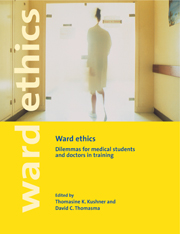Book contents
- Frontmatter
- Contents
- Acknowledgments
- List of contributors
- Prologue. Breaking the silence
- Letter from a young doctor
- Part I On caring for patients
- Section 2 Problems in truth-telling
- Section 3 Setting boundaries
- Part II On becoming a “team player”: searching for esprit de corps and conflicts of socialization
- Section 5 Argot, jargon, and questionable humor: assuming the mantle at the patient's expense
- Section 6 Making waves: questioning authority and the status quo
- Section 7 Perceiving misconduct and whistle-blowing: observing peers or superiors commit an act deemed unethical
- Epilogue: Using this book
- Glossary
- Index
Letter from a young doctor
Published online by Cambridge University Press: 05 February 2015
- Frontmatter
- Contents
- Acknowledgments
- List of contributors
- Prologue. Breaking the silence
- Letter from a young doctor
- Part I On caring for patients
- Section 2 Problems in truth-telling
- Section 3 Setting boundaries
- Part II On becoming a “team player”: searching for esprit de corps and conflicts of socialization
- Section 5 Argot, jargon, and questionable humor: assuming the mantle at the patient's expense
- Section 6 Making waves: questioning authority and the status quo
- Section 7 Perceiving misconduct and whistle-blowing: observing peers or superiors commit an act deemed unethical
- Epilogue: Using this book
- Glossary
- Index
Summary
Recently, I received the following letter from a young woman:
I am a lowly intern and I've had a long hard extraordinary week, some of it exhilarating. I haven't really slept in weeks and when I do sleep, I dream of my patients. I sent a little old lady with dead legs home to die. I told a man today he had cancer. It's late at night now, and I am worrying about them, but also I'm worrying about me. I'm so tired and lonely and I'm starting to laugh (hard) at things I shouldn't laugh at. I don't understand exactly what is happening to me – but it's happening fast …
Here is a person, like many of you, in dire need. She wants to be a doctor – and a good one – but her training experiences are making her question her ability, her knowledge, and why she went into this profession in the first place.
The answer to why we choose medicine is very individual. In my own case, medicine was a part of my heritage. My father was a general practitioner and from my earliest days, when we lived upstairs and he worked downstairs, I heard the cries and moans of the patients he was treating and hurting. When he died, I was only 12; I decided I would be his reincarnation. It seemed the noblest thing in the world to do – a person who could heal wounds could do anything, and I still believe it.
- Type
- Chapter
- Information
- Ward EthicsDilemmas for Medical Students and Doctors in Training, pp. 5 - 8Publisher: Cambridge University PressPrint publication year: 2001



